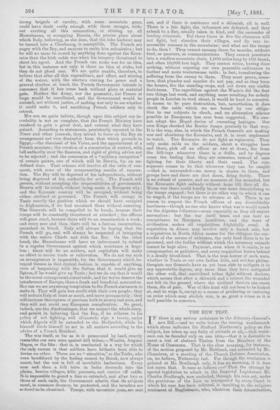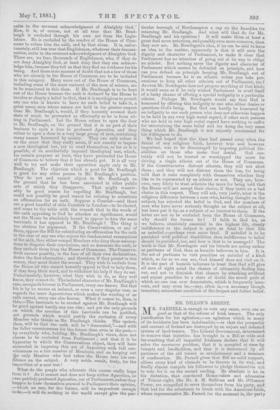THE NEW TEST.
"IF there is any serious resistance to the Attorney-General's new Bill,—and we write before the veering weathercock which alone indicates Sir Stafford Northcote's policy on the subject, has taken up any fixity of attitude at all,—that resist- ance can be founded only on one idea,—that it is desirable to exact a test of abstract Theism from the Members of the House of Commons. That is the clear meaning, for instance, of the motion proposed by Mr. Hubbard, and seconded by Mr. Chambers, at a meeting of the Church Defence Assooiation, on, we believe, Wednesday last. For though the resolution is pointed at Mr. Bradlaugh only, it has no meaning, if it does not mean that. It runs as follows :—" That the attempt by special legislation to admit to the Imperial Legislature Mr. Charles Bradlaugh, now excluded, through his own act, under the provisions of the Law as interpreted by every Court to which his case has been referred, is insulting to the religious sentiment of Englishmen, who, whatever their denomination,
unite in the reverent acknowledgment of Almighty God." Now, it is, of course, not at all true that Mr. Brad- laugh is excluded through his own act from the Legis- lature. He is excluded by the resolve of the House of Com- mons to refuse him the oath, and by that alone. It is, unfor- tunately, still less true that Englishmen, whatever their denomi- nation, unite in the reverent acknowledgment of Almighty God. There are, we fear, thousands of Englishmen, who, if they do not deny Almighty God, at least deny that they can acknow- ledge him, because they tell us that they find no evidence for his being. And there is no manner of doubt that not a few of those who are already in the House of Commons are to be included in this category. Many more out of the House of Commons, including some of the most eminent of the men of science, are
to be numbered in this class. If Mr. Bradlaugh is to be kept
out of the House because the oath is declared by the House to involve so clearly a belief in God, that it is sacrilegious to permit any one who is known to have no such belief to take it, a great many men whose names are held in far greater respect than Mr. Bradlaugh's, would, if they honestly avowed their state of mind, be prevented as effectually as he is from sit- ting in Parliament. Let the House refuse to open the door to Mr. Bradlaugh, on the ground that it is no part of their business to open a door to professed Agnostics, and they refuse to open a door to a very large group of men, containing many names honoured by society. They can only refuse it on the score that they really mean, if not exactly to impose a new theological test, yet to avail themselves, so far as it is possible, of an accidentally imposed theological test, which, for certain purposes at least, they have persuaded the House of Commons to believe that it has already got. It is all very well to try and make their opposition apply only to Mr. Bradlaugh. The objection which is good for Mr. Bradlaugh is good for ally other person in Mr. Bradlaugh's position. They do not and cannot object to Mr. Bradlaugh on the ground that he has been associated in other public acts of which they disapprove. That might conceiv- ably be good reason for expelling Mr. Bradlaugh, but could not possibly be good reason for refusing to substitute an affirmation for an oath. Suppose a Comtist—and there are a good handful of able Comtists in London—to be elected, and come to the table with the remark that to the words of the oath appealing to God he attaches no significance, would not the House be absolutely bound to oppose to him the same
barricade it has opposed to Mr. Bradlaugh The thing is too obvious for argument. If the Conservatives, or any of them, oppose the Bill for substituting an affirmation for the oath in the case of any one who rejects the fundamental assumptions of the oath, they either compel Members who deny these assump- tions to disguise their convictions, and so desecrate the oath, or they exclude them from the House of Commons. The Conserva- tives cannot possibly, in the face of all their own declarations, desire the first alternative ; and therefore, if they persist in this course, they must desire the second. They wish to exclude from the House all who cannot honestly appeal to God to help them, if they keep their word, and to withdraw his help if they do not. Unfortunately, however, what they wish to do, as they well know, they cannot do. The isolated character of dr. Bradlaugh's case, as regards his seat in Parliament, every one knows. But that his is by no means an isolated, or even a very singular case, as regards the inner Agnosticism which makes the wording of an oath unreal, every one also knows. What it comes to, then, is this,—The barricade to be erected against Mr. Bradlaugh will be good against hardly any one else ; and yet the only grounds on which the erection of this barricade can be justified, are grounds which would justify the exclusion of every Member who thinks as Mr. Bradlaugh thinks. The upshot, then, will be that the oath will be " desecrated,"—and with far fuller consciousness for the future than even in the past,— by everybody who, holding Mr. Bradlaugh's views, does not choose to be excluded from Parliament ; and that if it be hypocrisy to which the Conservatives object, they will have succeeded in imposing this act of hypocrisy with full con- sciousness on a fair number of Members, and on keeping out tile only Member who had taken the House into his con- fidence on the subject. A very noble result, truly, for the imposition of a new test !
What do the people who advocate this course really hope
from it As it cannot and does not keep either Agnostics, or Even publicly professed Agnostics, out of Parliament,unless they happen to have themselves avowed to Parliament their opinion, —which no one, for the future, will be imprudent enough to do,—it will, do nothing in the world except give the par-
ticular borough of Northampton a rap on the knuckles for returning Mr. Bradlaugh. And what will that do for Mr.
Bradlaugh and his opinions B It will make them at least a groat deal more notorious, and possibly even more common, than they now are. Mr. Newdegate 's idea., if he can be said to have an idea in the matter, apparently is that it will save the dignity and character of Parliament, to make it clear that Parliament has no intention of going out of its way to oblige an atheist. But nothing saves the dignity and character of Parliament which cannot be defended on principle, and how can you defend on principle keeping Mr. Bradlaugh out of Parliament because he is an atheist, unless you take pre- cautions to keep all other atheists out of Parliament, too As even Mr. Newdegate does not propose anything of that kind; it would seem as if he only wished Parliament to avail itself of a lucky chance of offering a special indignity to a particular atheist. Perhaps Mr. Newdegate would say that God is honoured by offering this indignity to one who either denies or questions God's being. But God can hardly be honoured by an indignity to one such person who does not otherwise happen to be held in any very high social regard, if other such persons who are held in very high social regard have nothing to suffer for entertaining the same belief and for doing the very same thing which Mr. Bradlaugh is not unjustly condemned for his willingness to do.
Wo had hoped that the time had passed away when the denial of any religious faith, however true and however important, was to be discouraged by imposing political dis-
abilities on those who make that denial. God cer- tainly will not be trusted or worshipped the more for driving a single atheist out of the House of Commons. If the Constituencies distrust atheists, they will not elect them ; and they will not distrust them the loss, for being told that it rests completely with themselves whether they like to be represented by an atheist or not. They are, how- ever, very likely to trust atheists the more for being told that the House will not accept their choice, if they insist on a bad choice in this respect. They will ask, very justly, what is the religious difference between a man who, having thought on the subject, has rejected the belief in God, and the numbers of men who have never seriously thought on the subject at all, but have put it by, as a subject of no interest to them. If the latter are not to be excluded from the House of Commons,
why should the former be V If faith in God be, as wo believe, absolutely essential to the highest life, steady
indifference to the subjeot is quite as fatal to that life as unbelief,—perhaps even more fatal. If unbelief is to be punished with political disabilities, then indifference to belief should be punished, too, and how is that to be managed ? The truth is that Mr. Newdegate and his friends are acting rather as partisans of God, than as humble believers in him. It is the act of partisans to visit penalties on unbelief of a kind which, so far as we can see, God himself does not visit on it. It is the part of humble believers to trust that God will give all men of right mind the chance of ultimately finding him. out, and not to diminish that chance by attaching artificial and unjust penalties to a state of doubt the moral guilt of which no one can ever demonstate, which is frequently inno- cent, and may even be,—nay, often is,—a necessary though transitory antecedent condition of the deepest and fullest belief.



































 Previous page
Previous page